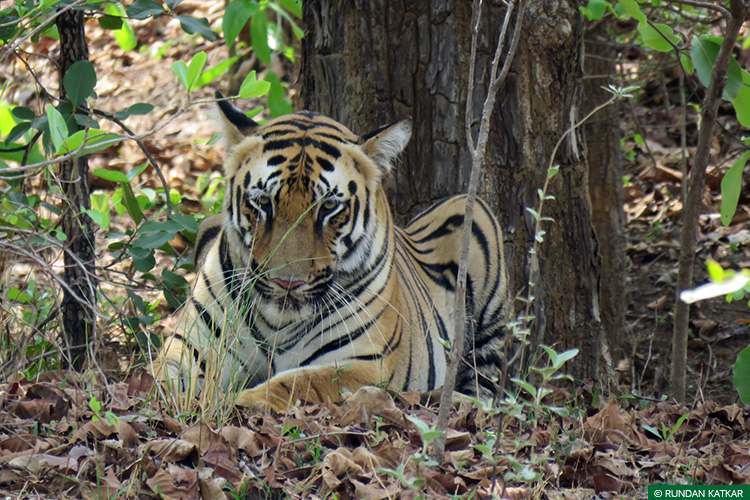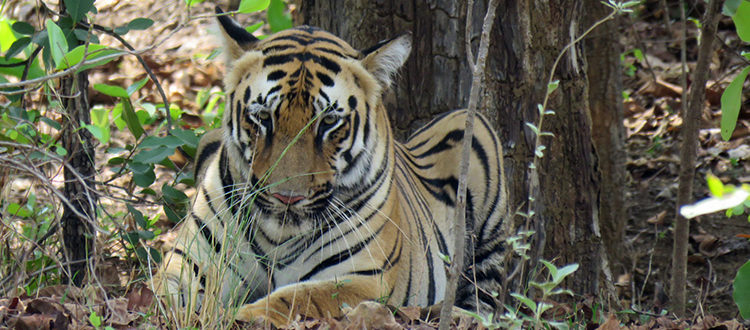You Only Live Twice
By Jaydeep Patil
For the past six months, I have been walking the forests of Bramhapuri. Of the many adventures I have had in this place, I think the most hauntingly memorable is my encounter with ‘Roxanne’.
Roxanne was a young tigress that our Rapid Response Team (RRT) was assisting the Maharashtra Forest Department in tracking. She was suspected to have attacked and killed two people. The forest department had given her an official identification code, but I called her Roxanne. She had six distinct stripes on her back, which reminded me of a six-string. My first guitar was named Roxanne.
No one had any success in finding Roxy. She had started identifying the locations of the camera traps and avoiding them.
It was July in Bramhapuri. The clouds never cleared and the rains reigned supreme. After days of camera trapping and tracking, no one had any success in finding Roxy. She had started identifying the locations of the camera traps and avoiding them. Many times we would find pugmarks on a trail leading up to and ahead of a camera trap, but none in front of it.
On another such day, Nikhil and I (Nikhil Dandekar is my colleague at Wildlife Trust of India’s Vidarbha Tiger Project) went to check the camera traps at a place Roxy was known to frequent. We walked all around the area checking camera trap after camera trap – no tiger. After a while we got weary of looking at captures of people, cattle and goats. Starving and disheartened, we decided to call it a day.

A View to a Kill
We reached our vehicle only to find a small group of people waiting next to it – a few cattle herders accompanied by the local forest guard. There had been a cattle kill nearby; the cattle herders had witnessed it and run to call the guard. This was the news we had been waiting for. Hunger forgotten and spirits renewed, we decided to locate the kill. We were being led to the location where the attack had happened when we spotted some blood on the ground. After a quick look around we found more signs. There was a distinct drag trail visible through the thicket. We followed it to where ol’ Roxy had dragged her quarry – a nice cosy spot under a lone Butea tree on a hillock. There were bushes all around, making it very secluded. We placed our cameras, called in the tranquilising team, inspected the area and were returning to our vehicle thinking our job was done.
As we were approaching our car, Vilas, our field assistant detected some pugmarks leading in the general direction of the kill. We thought of checking if they were from before or after the kill, so we followed them. We had gone just about 10 metres when we saw it: a perfect crime scene. It was the exact spot where the kill had taken place, complete with pugmarks, hoof marks, a drag trail and even a blood trail. I went from Johnny English to Sherlock Holmes in two seconds. We reconstructed the act as the evidence suggested: how Roxy had stalked the herd of cattle; how they ran helter-skelter as she burst forth from the bushes; where she had finally caught her chosen prey. Finally we came to the place where we had first picked up her trail. I realised that we had circled back to the base of the hillock where we had found the kill.
The pit in my stomach was endless. I saw Roxy staring down at me with those smouldering eyes. Time ceased to exist in that unending moment.
There was a sudden break in the silence as Nikhil’s phone rang. It was HQ calling. He answered the call and I turned back towards the hillock. And just then I heard it: a low, rumbling growl coming from the shrubbery on the crown of the hillock. The pit in my stomach was endless. I saw Roxy staring down at me with those smouldering eyes. Time ceased to exist in that unending moment. She must have been 20 metres from where I stood mesmerised; a leap and a bound and I would have been dessert (at least I’d like to think I’m tasty enough). Abruptly, she turned and vanished into the undergrowth, leaving my mind numb and my heart racing.
Roxy was a man-killer according to ‘experts’ and a man-eater according to the press. Maybe they were wrong about her. Maybe she was just misunderstood and the attacks were unfortunate accidents. Or maybe she was just charmed by my spectacularly charismatic moustache and decided to let me go. Who knows? That last one, to me, seems highly possible.
The author is an Assistant Field Officer with Wildlife Trust of India’s Vidarbha Tiger Project. We can vouch for the fact that he does, indeed, have a spectacularly charismatic moustache.









